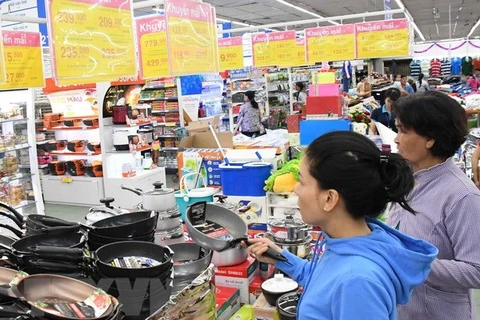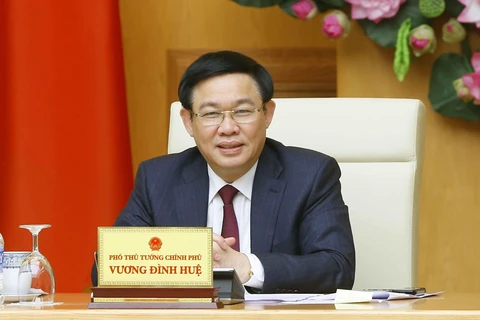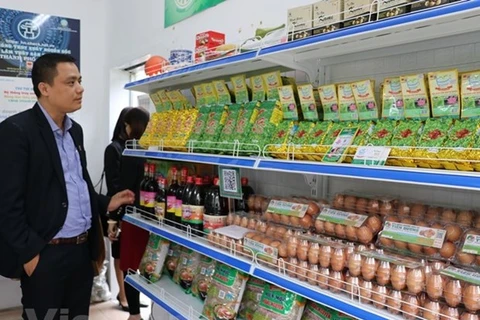Hanoi (VNA) – The global trade slowdown is likely to sap the domestic economy, and if the prices of goods and services are not well controlled, the country will fail to keep the inflation rate at the desired level for the whole year 2019, economist Nguyen Minh Phong told reporter.
The following is the full text of the interview:
Reporter: What is your evaluation on Vietnam’s economic performance in Quarter 1?
Nguyen Minh Phong: In general, there are several robust signs reflecting Vietnam’s stable economic growth as well as its efforts to further the economic growth in 2019.
The country’s economic growth was impressive in the first quarter of the year in the context of a global slowdown. The gross domestic product (GDP) expanded 6.79 percent during January-March, lower than the 2018 figure of 7.45 percent but still higher than the same time during 2011-2017.
Particularly, as compared to the global economic situation, it showed the country’s efforts to improve investment climate have continued to produce good results.
The agricultural sector was thriving in the quarter, manifested through the formation of agricultural value chains with participation of large domestic and foreign firms who poured into the industry billions of USD.
Robust sign also came from innovative businesses, who attracted capital of magnitudes of international investors.
Besides, there was a strong surge in the number of newly-registered enterprises, while the number of companies resuming operation doubled the figure of firms suspending operation.
Notably, the amount of FDI capital rose 80 percent against the same time last year. Local equitisation process has become more attractive than ever before as foreigners’ stake acquisition tripled the amount last year.
We have maintained a fairly positive Consumer Price Index (CPI), which rose 2.63 percent in the quarter, and this is another impressive factor of the economy, albeit the lowest rate in the past three years.
 Economist Nguyen Minh Phong believed that it is crucial to control prices of necessary goods. (Photo: VietnamPlus)
Economist Nguyen Minh Phong believed that it is crucial to control prices of necessary goods. (Photo: VietnamPlus)
Reporter: Report from the General Statistics Office has pointed out several external factors that may affect local economy such as global downturn and decreasing investment activities. Do you worry about them?
Nguyen Minh Phong: I think there are two major impacts that we need to pay attention to this year.
The global trade fell to the lowest in the past decade as it slipped 1.8 percent during January-March. Some big countries like China and the Republic of Korea experienced strong decreases of 20 percent and 15 percent, respectively.
If no effort is made, we will face serious threat of trade deficit.
Besides, the exchange rates may suffer from the currency war and oil prices.
We will also face headwind in controlling inflation rate in 2019 as the power price increased 8.36 percent right from the outset of the year.
Reporter: Although CPI increase fell to the lowest level in recent three years, it would be difficult to control inflation rate in the coming months. In your opinion, what should receive special attention?
Nguyen Minh Phong: In my viewpoint, power price is a key to control price change in other goods, particularly price-sensitive products.
Prices of public services such as medical services or hospital fees must be well controlled while unfounded rumours must be prevented so that they could not affect the market.
I think it is crucial to maintain policies to control the prices of essential commodities.
Reporter: What are your comments on the fact that trade surplus in Quarter 1 was not so high, while many free trade deals were signed, especially the Comprehensive and Progressive Agreement for Trans-Pacific Partnership (CPTPP)?
Nguyen Minh Phong: Exports in the first three months only inched up 4.7 percent as compared to 25 percent the same time last year. However, if we take a look on the trade deficit situation in recent years, the growth showed positive points.
As the CPTPP officially came into force on January 19, 2019, we have not felt its direct impacts in the first quarter. The pact is expected to have good effects on local firms from the second half of the year.
Reporter: What should we do to achieve targets set from the beginning of the year?
Nguyen Minh Phong: This is a great challenge to have better economic growth and lower CPI amidst the difficult global economy.
Along with breakthroughs in institutions and infrastructure, more efforts are needed to boost development of the private sector and embrace the Fourth Industrial Revolution. This means we should remove bottlenecks for private enterprises, in order to turn the sector into a key motive for economic growth.
In addition, we should promote application of advanced technologies and give more support to startup and innovative firms so that they will have new development strategies.
Reporter: Thank you for the interview./.

























